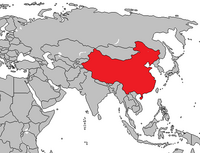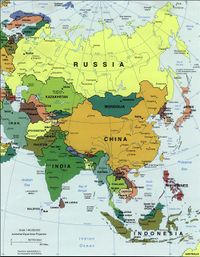Razib Khan points out in Discover Magazine, "most secular nations in the world are those of East Asia, in particular what are often termed “Confucian societies.” It is likely therefore that the majority of the world’s atheists are actually East Asian."[3] See: Asian atheism
The current atheist population mostly resides in East Asia (particularly China) and in secular Europe/Australia among whites.[4] See: Atheist population and Global atheism and Western atheism and race
China has the world's largest atheist population.[1][2] China is a communist country and the Communist Party of China requires its members to be atheists (see: Atheism and communism).[5]
In 2016, the International Business Times reported: "A senior Chinese advisor on religious affairs has said the country should promote atheism throughout society, in remarks that appear to reflect a deepening campaign to reinforce traditional Marxist values in China — and could add to concern about official attitudes among believers in the country’s five officially recognized religions."[6]
Socioeconomic factors can cause differences in regional intelligence levels (for example, wealth which can affect the quality of education, health care and nutrition). Although social scientists have disputes about the accuracy of IQ scores in a given region, regions do vary in terms of their IQ scores.[7][8][9] Ethnic groups facing discrimination as immigrants and their IQs temporarily dropping and then later rebounding when the discrimination is over, suggests that IQ is significantly affected by one's environment and not due to any inherent and permanent genetic differences between races.[10]
There is a significant amount of racism in the atheist population and this includes atheists in East Asia/China (see: Atheism and racism and East Asia, China, atheism and racism). For example, the Chinese have a significant amount of racist attitudes against the Japanese and towards blacks/Africans so it is unlikely there is a significant amount of intermarriage between the Chinese and these groups/geographical regions (see: China and racism).
Although social scientists have disputes about the accuracy of IQ scores in a given region, regions do vary in terms of their IQ scores.[7][8][9]
Unless otherwise indicated, the national IQ scores given below for Asian, European countries and Australia comes from the work carried out from 2002 to 2006 by Richard Lynn, a British Professor of Psychology, and Tatu Vanhanen, a Finnish Professor of Political Science, who performed IQ studies in more than 80 countries.[7]
China has the 5th highest national IQ in the world with a score of 105.[7] China's Zhejiang province is China's Christianity heartland.[11] In 2005, the Chinese Journal of Endemiology (Owned by China ‘s ministry of health) reported that Zhejiang province had the highest IQ of all the provinces in China with an average IQ of 115.8 which was markedly higher than China's average IQ at the time which was a score of 103.4.[11]
In the latter part of the 20th century and throughout the 21st century, China has seen a rapid growth of evangelical Christianity within their nation, increased economic development and a leap in intelligence scores.[12][13] See also: Growth of Christianity in China and Protestant Ethic and the Spirit of Capitalism and East Asia and global desecularization
In addition, compared to China, Singapore and South Korea (which have higher degrees of religion/religious freedom) have higher national IQ scores of 108 and 106 respectively.[7] In addition, Hong Kong, which has a greater degree of religiosity than China as a whole and greater religious freedom than mainland China, has a regional IQ score of 108.[7] See also: China, state atheism and persecution
John W. Traphagan on East Asia and intelligence
See also: Intelligence testing and Theory of multiple intelligences
John W. Traphagan's article published in The Diplomat entitled Asia’s Cult of Intelligence declares:
| “ | I have been traveling to East Asia (and many other parts of the world) for more than 25 years and over that time one of the things that has always struck me is how intelligent the general public in countries like Japan appear to be. It’s not that there aren’t dummies in East Asia, but it always seems that the average level of education and ability to think about the world intelligently and critically is impressively widespread. I’ve often thought about why this is the case and also why the same seems more difficult to say about the U.S. The answer, I think, can be found in a comment science fiction writer Isaac Asimov made about the U.S. while being interviewed in the 1980s: “There is a cult of ignorance in the United States, and there has always been. The strain of anti-intellectualism has been a constant thread winding its way through our political and cultural life, nurtured by the false notion that democracy means that my ignorance is just as good as your knowledge.”
Asimov is right on the mark, and this cult of ignorance is the most serious national security issue facing the U.S. today. It is more important than the external threats from terrorists or the rise of a politically and economically powerful China. And a major part of the reason it is such an major issue for Americans to fix is that our immediate competitors, particularly those in Asia, have managed to create a culture in which rather than a cult of ignorance, a cult of intelligence plays a major role in shaping attitudes about the world and, thus, policies about dealing with other countries. Many Americans are aware that the U.S. does not score well on measures such as international student assessment tests when compared to other industrial countries. For example, the 2011 Trends in International Mathematics and Science Study (TMISS) the top five countries for math were Singapore, South Korea, Hong Kong, Taiwan, and Japan—the U.S. is not in the top ten. It is better by 8th grade, where the same counties are in the top five (although the order changes) and the U.S. makes number 9. Roughly the same pattern can bee seen for science results. This doesn’t seem too bad, but in a different testing organization’s measure, the Programme for International Student Assessment, the U.S. does not fare quite so well, scoring 36th for math, 28th for science, and 24th for reading. With the exception of science, where Finland is ranked 5th, all of the top five countries in this measure are from East Asia. Enjoying this article? Click here to subscribe for full access. Just $5 a month. American policy has generally worked from the assumption that the problem lies in basic weaknesses in the structure of our educational system with its inherent inequalities and the way in which our school curricula are constructed. These certainly have contributed to comparatively weak scores. I have long been convinced that one of the reasons Japan’s educational system is better than the U.S.—at least in the sense that a very broad swath of the general public receives a good and equal education through high school—is related to funding.[14] |
” |
Articles on Asian countries with high IQs
Hong Kong and intelligence
- High IQ and low technology: Hong Kong's key to success, Researchgate
- The intelligence of six-year-olds in Hong Kong, J Biosoc Sci. 1989 Oct;21(4):461-4.
Singapore and intelligence
CNN's article entitled Why Singapore has the smartest kids in the world declares:
| “ | It's a world-class teacher's pet -- a straight-A student that's top of the class: Singapore is officially the country with the smartest high-school kids in the world.
The country's academic success has helped it become a thriving economy, and the way it has built its education system could hold lessons for the rest of the world. "Singapore is a fascinating case," said Marc Tucker, the president of the U.S. National Center on Education and the Economy. "[It] was a major British port before the Second World War. When Britain got out and closed its base Singapore was in terrible shape. "Now today they are one of the best performing economies in the entire world. They did it largely with education and training." If Singapore's rags-to-riches transition was built on education, the secret of its education system is the quality of its teachers. "They source their teachers from among the best kids coming out of their high schools," explained Tucker.[15] |
” |
South Korea and Intelligence
- The Relationship between Executive Functions and IQ in Korean Children and the Comparison with Chinese Children., Appl Neuropsychol Child. 2016 May 16:1-8.
China and intelligence
- "IQ has generally increased more rapidly in developing countries, with the biggest leaps seen in China and India. Progress in the developed world has been chequered - the data seem to indicate steady increases in the US, for example, but a decline in the UK.", BBC, 2015[13]
China and eugenics
See also: Eugenics
- Chinese project probes the genetics of genius, Nature 497, 297–299 (16 May 2013)
Asian atheism and social intelligence
In comparison to Asian atheism (Asian cultures are known for stressing social harmony), Western atheists have lower social intelligence (see: Atheism and social intelligence).
East Asian values
The 10 Values That Undergird East Asian Strength and Success, NY Times
Atheism and culture
High IQ East Asian countries compared to secular Europe and Australia
High IQ nations in East Asia have higher national IQs than secular European countries and irreligious Australia.
European atheism and IQ scores
See: European atheism and intelligence
Irreligious Australia and intelligence
See also
Notes
- ↑ 1.0 1.1 Top 50 Countries With Highest Proportion of Atheists / Agnostics (Zuckerman, 2005)
- ↑ 2.0 2.1 A surprising map of where the world’s atheists live, Washington Post By Max Fisher and Caitlin Dewey May 23, 2013
- ↑ Most atheists are not white & other non-fairy tales, Discover magazine
- ↑ A surprising map of where the world’s atheists live, By Max Fisher and Caitlin Dewey, Washington Post, May 23, 2013
- ↑
- ↑ Senior Chinese Religious Advisor Calls For Promotion Of Atheism In Society, International Business Times
- ↑ 7.0 7.1 7.2 7.3 7.4 7.5 WORLD RANKING OF COUNTRIES BY THEIR AVERAGE
- ↑ 8.0 8.1 Book Review: IQ and the Wealth of Nations, Nature
- ↑ 9.0 9.1 Controversial study of African IQ levels is 'deeply flawed', Science Daily, January 21, 2010
- ↑ Charles Murray Still Convinced That Whites Are Smarter Than Blacks by Kevin Drum, Mother Jonees, 2017
- ↑ 11.0 11.1 China's Christian Province had the highest IQ in China in 2005, Examining Atheism
- ↑
- China on course to become 'world's most Christian nation' within 15 years
- The Protestant Work Ethic: Alive & Well…In China By Hugh Whelchel on September 24, 2012
- ↑ 13.0 13.1 Are human beings becoming smarter, BBC, March 2, 2015
- ↑ Asia’s Cult of Intelligence by John W. Traphagan, The Diplomat, 2014
- ↑ Why Singapore has the smartest kids in the world, CNN

